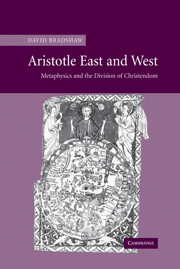Book contents
- Frontmatter
- Contents
- Preface
- 1 The Aristotelian beginnings
- 2 The Prime Mover
- 3 Between Aristotle and Plotinus
- 4 Plotinus and the theory of two acts
- 5 The Plotinian heritage in the West
- 6 Gods, demons, and theurgy
- 7 The formation of the eastern tradition
- 8 The flowering of the eastern tradition
- 9 Palamas and Aquinas
- 10 Epilogue
- Bibliography
- Index
5 - The Plotinian heritage in the West
Published online by Cambridge University Press: 22 September 2009
- Frontmatter
- Contents
- Preface
- 1 The Aristotelian beginnings
- 2 The Prime Mover
- 3 Between Aristotle and Plotinus
- 4 Plotinus and the theory of two acts
- 5 The Plotinian heritage in the West
- 6 Gods, demons, and theurgy
- 7 The formation of the eastern tradition
- 8 The flowering of the eastern tradition
- 9 Palamas and Aquinas
- 10 Epilogue
- Bibliography
- Index
Summary
After the death of Plotinus the mantle of leadership among Platonists passed to his former student, Porphyry (232–c. 305). It has long been recognized that Porphyry played a major role in the formation of Neoplatonism in the western half of the Empire. Augustine, for example, discusses his views at length in Book x of The City of God, and Boethius relies on him heavily in the interpretation of Aristotle's logic. One of Porphyry's most influential acts was to write a commentary on the Chaldaean Oracles, an obscure piece of religio-philosophical verse dating from the middle of the second century. By doing so he brought into the orbit of Neoplatonism the system of ritualized interaction with the gods known as theurgy. Porphyry himself had strong doubts about theurgy; he regarded it as at best a useful way of cleansing the soul, one merely preparatory for the only true salvation, which is achieved through philosophy. But his student Iamblichus rose to its defense, and this quarrel between Porphyry and Iamblichus marked a major parting of the ways in the early history of the school. Iamblichus' writings ultimately became definitive for Neoplatonism in the eastern half of the Empire, whereas they remained virtually unknown in the West.
In this chapter we will examine Porphyry and other Neoplatonists of the West. Part of our story will be that of how energeia as it is found in Plotinus and Porphyry was transformed into the medieval (and especially Thomistic) concept of esse, the “act of being.”
- Type
- Chapter
- Information
- Aristotle East and WestMetaphysics and the Division of Christendom, pp. 97 - 118Publisher: Cambridge University PressPrint publication year: 2004



